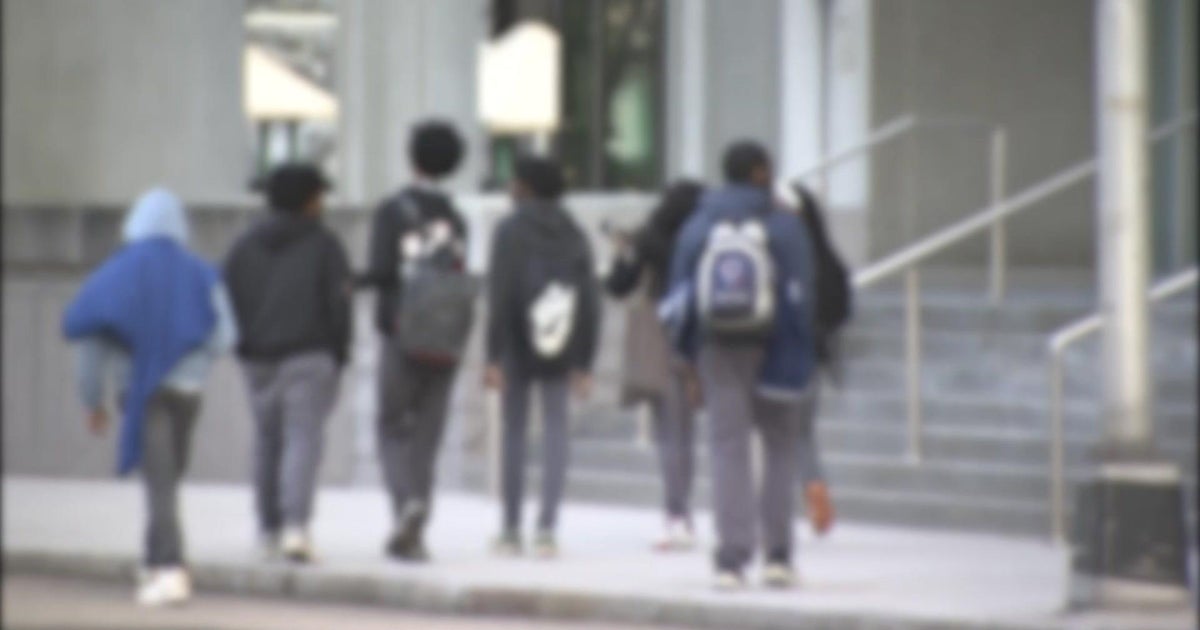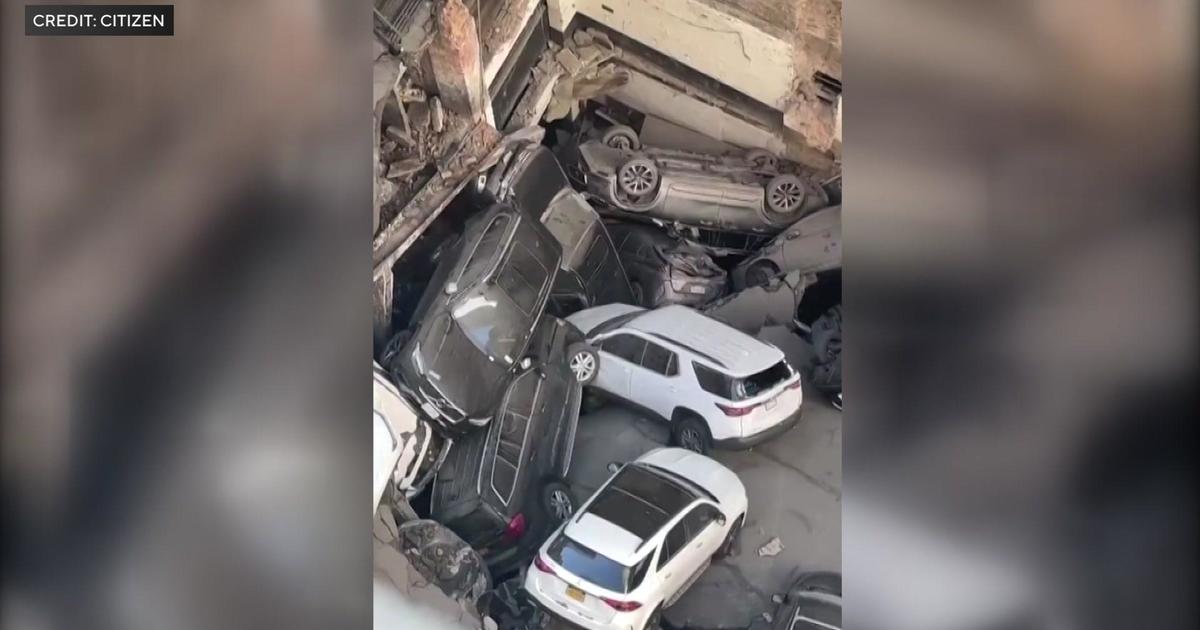De Blasio In 5th 'State Of The City' Address: NYC Must Become 'Fairest Big City In America'
NEW YORK (CBSNewYork) - In his fifth "State of the City" address Tuesday night, Mayor Bill de Blasio said he had the rest of his term to ensure that New York City will become "the fairest big city in America."
The mayor spoke Tuesday night at the Kings Theatre in Brooklyn.
"Three years, 10 months and 15 days – that's how long this administration has to ensure that we become the fairest big city in America," de Blasio said. "And we will take on that mission, and we will do it with speed, and we'll do it with urgency."
De Blasio said making New York City the America's fairest is particularly urgent. Without naming the Trump administration at the outset, he said, "We in fact have to be the antidote to the sickness that is gripping our nation."
De Blasio said the country is in a state of extreme inequality that is near to the point of making a "mockery" of a democratic society. He also repeatedly said democracy was imperiled, and called for changes to the city charter to ensure that campaigns are financed with public funds, votes are counted, and voters engaged.
But he first outlined a 12-point plan to make New York City fair for all regardless of what is happening elsewhere.
First, de Blasio called for "listening to the voice of the people."
"Nothing comes through louder and clearer -- and yes, we New Yorkers are loud – nothing comes through more than that daily demand for fairness," de Blasio said. "New Yorkers aren't afraid of tough challenges. But we want the rules of the game to be fair."
Second, the mayor called for "making the safest big city in America even safer," by expanding neighborhood policing, keeping crime and arrests low at the same time, and placing body cams on all patrol officers by the end of the year.
"The more we heal the wounds of the past, the deeper the bonds become between police and community, and the further we go," de Blasio said.
Third, the mayor called for 3K – free preschool for 3-year-olds – for every New York City resident. He said the plan is to reach all kids by 2021, and the effort will tap into their potential "far more than ever before."
Fourth, de Blasio called for an expansion of affordable housing, noting that what he called the biggest affordable housing plan in the city's history had just gotten even bigger, and fifth, he called for better-paying jobs for New York City residents.
Sixth, de Blasio focused extensively on protecting New Yorkers – particularly younger and future generations – from climate change. He said it was particularly important given that President Donald Trump has withdrawn from the Paris agreement.
He called for speeding up the process of cutting emissions and setting up more electric vehicle charging stations, and divesting $5 billion in pension fund investments from fossil fuel companies.
De Blasio focused seventh on "big fights ahead" in both Washington, D.C. and Albany. Notably, he emphasized the need to fix the subway system, and repeated his call for a millionaires' tax to fund the repairs.
But de Blasio said state lawmakers and only state lawmakers can pass legislation to end the crisis in the subway system. He said he would sit down with leaders in Albany "anytime, anywhere," but on the condition that "the money raised in New York City stays in New York City."
In Washington, de Blasio said the city would be fighting for the 30,000 New Yorkers and 700,000 Americans known as dreamers who were brought to the country illegally as children. Speaking a day after President Trump announced his $1.5 trillion infrastructure plan, de Blasio called for "a real infrastructure plan" with ample federal dollars to "fix what's broken and build the economy of the future."
Eighth, de Blasio called for a full-on effort to fight the opioid epidemic, "with the same zeal; the same intensity with which we've taken on homicides and traffic fatalities."
Noting that homicides last year were at their lowest level since 1951, and traffic fatalities at their lowest in a century, de Blasio said the opioid crisis can likewise be dealt with in New York City. He said the city plans to hold responsible "the big pharmaceutical companies that profited from people's pain."
Ninth, de Blasio emphasized the Thrive NYC effort for mental health care. He said the city now has the most comprehensive approach to mental health of any U.S. city.
"Nothing exemplifies fairness more than universal access to health care, and that is true whether it is a physical health condition or a mental health condition," de Blasio said.
Tenth, de Blasio called for a commitment and enforcement of gender equality – specifically equal pay for equal work. Eleventh, he called for maintaining a situation where there is less crime and also fewer arrests – and repeated his call to close the jail complex at Rikers Island.
Lastly, de Blasio called for "addressing decades of neglect and the mistakes of the past" at the New York City Housing Authority. The investments are already being used for 1,000 new roofs in public housing developments where residents have suffered by mold and leaks, as well as new boilers and heating systems, crime reduction efforts, and faster repairs.
But the mayor's tone grew more ominous as he talked about what he called the biggest obstacle to moving ahead.
"You can't fight for greater equality with less democracy," the mayor said. "History teaches us that fundamental social change comes from the bottom up, not form the top down," de Blasio said.
De Blasio announced a plan for changes in the city charter to improve the campaign finance system, and programs to encourage voting and other types of civic engagement.
Among the points in the plan were a proposal for "deep public financing" of local elections to keep money out of politics, and a change in the city charter to empower city government to handle outreach efforts that de Blasio said the Board of Elections "has consistently gotten wrong," such as mailing out postcards to remind voters of elections in this digital age.
De Blasio also said "the integrity of our elections" was under attack from foreign powers, referencing a recent report that Russia "successfully penetrated and compromised" voter registration rolls in several states. He called for efforts to ensure that all voters' ballots are counted.
The mayor also announced the appointment of a Chief Democracy Officer for the city who would solve the problem of low voter participation. De Blasio said there will also be outreach efforts for young people – specifically, reaching every 17-year-old in public school who will be eligible to vote in the next election.
De Blasio also called for other efforts to engage young people, including a participatory budgeting plan where every city public high school will get $2,000 for students to make decisions on how they use.
The mayor also called for state lawmakers to pass a law to allow early voting – which is permitted in numerous jurisdictions around the country but not New York – and for a "Get Counted" census campaign to encourage census participation in 2020.
"We are poised at the beginning of a new age – something we've never seen before," de Blasio said. "We have a new and bolder chapter to write, and its author will be you."
The plan to protect democracy by changing the city charter drew criticism from City Council Speaker Corey Johnson even before the mayor's speech. Johnson said any changes in the system are legislated through the City Council. Johnson favors a charter revision commission to look through the entire structure of city government.



